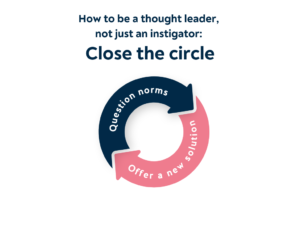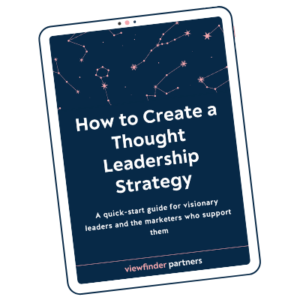In this post: Who gets to be a thought leader? How is thought leadership different than personal branding? And who pays for thought leadership?
This week, I was chatting with an executive coach. I told her that I help business leaders build thought leadership platforms.
Her response: “But how do you get the OK from their company? How do you make the business case for a personal brand? Aren’t the firms worried their people will get poached?”
That conversation made me think, and it brought up a lot of questions:
- What’s the difference between “personal branding” and “thought leadership”?
- Why is some people’s work elevated to “thought leadership” that is integral to their company’s branding, but other people’s work is flagged as a “personal branding” side project that’s seen as competition?
- If a leader writes a book, under their own name and to build their own brand, does the book help the author? Or does it help their company, too?
- What’s the relationship between a thought leader and the company they represent? Who owns the ideas? Do they belong to the leader? Or the company?
- In academia, professors are encouraged/required to publish their thinking and research regularly. What if we expected the same from corporate leaders?
- Are all of these questions really about power? (Who has the power to say yes, to share their ideas, and to fund thought leadership?)
What’s the difference between thought leadership and personal branding?
My baseline view: thought leaders are people, not companies. People have ideas. But “personal branding” has connotations of building your own personal star power and career trajectory — setting yourself up for your next opportunity.
I’d even say that personal branding is about YOU (your personality, sense of humor, ambition, career path, and story) more than it’s about your ideas.
Thought leadership isn’t just about your personal star power. It’s about the way you think, the ideas you’re stirring up, how you approach your industry’s big challenges. It’s taking your work and your thought processes and making them visible to people outside your immediate team. It’s about building a platform that other people can climb onto. In that sense, thought leadership is generous, not self-serving.
Thought leadership is about your ideas. It’s codifying your approach to your work. Sure, your personality and past certainly affect your thought leadership, but thought leadership isn’t really about YOU as a star — it’s about sharing ideas that could influence and aid someone else’s thinking.
How do you fund thought leadership?
So how do aspiring thought leaders convince the people at their firms who hold budget power to fund these thought leadership projects? How do they push past the “personal brand” grumbles and show their firms that their ideas can move the company forward?
I’d argue that it’s almost always a good thing when a company’s leaders are thinking in public and building a platform around their ideas.
And in my experience, it’s a lot easier to get your audience’s attention when you have a PERSON attached to your brand’s ideas. People bring story, perspective, and life to an idea. Without people, an idea is just a tagline. People turn thought leadership from #ad to #idea.
What do you think?
I don’t have answers to all of these questions, so I’d love to hear from you! How have you seen these dynamics play out inside companies? Who gets to be a thought leader, and who has the power and the sway to get their thought leadership funded? And finally: Do firms that more fund thought leadership have a competitive advantage?







